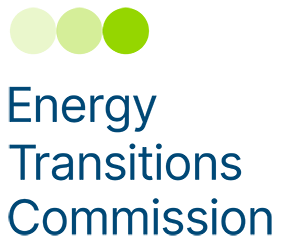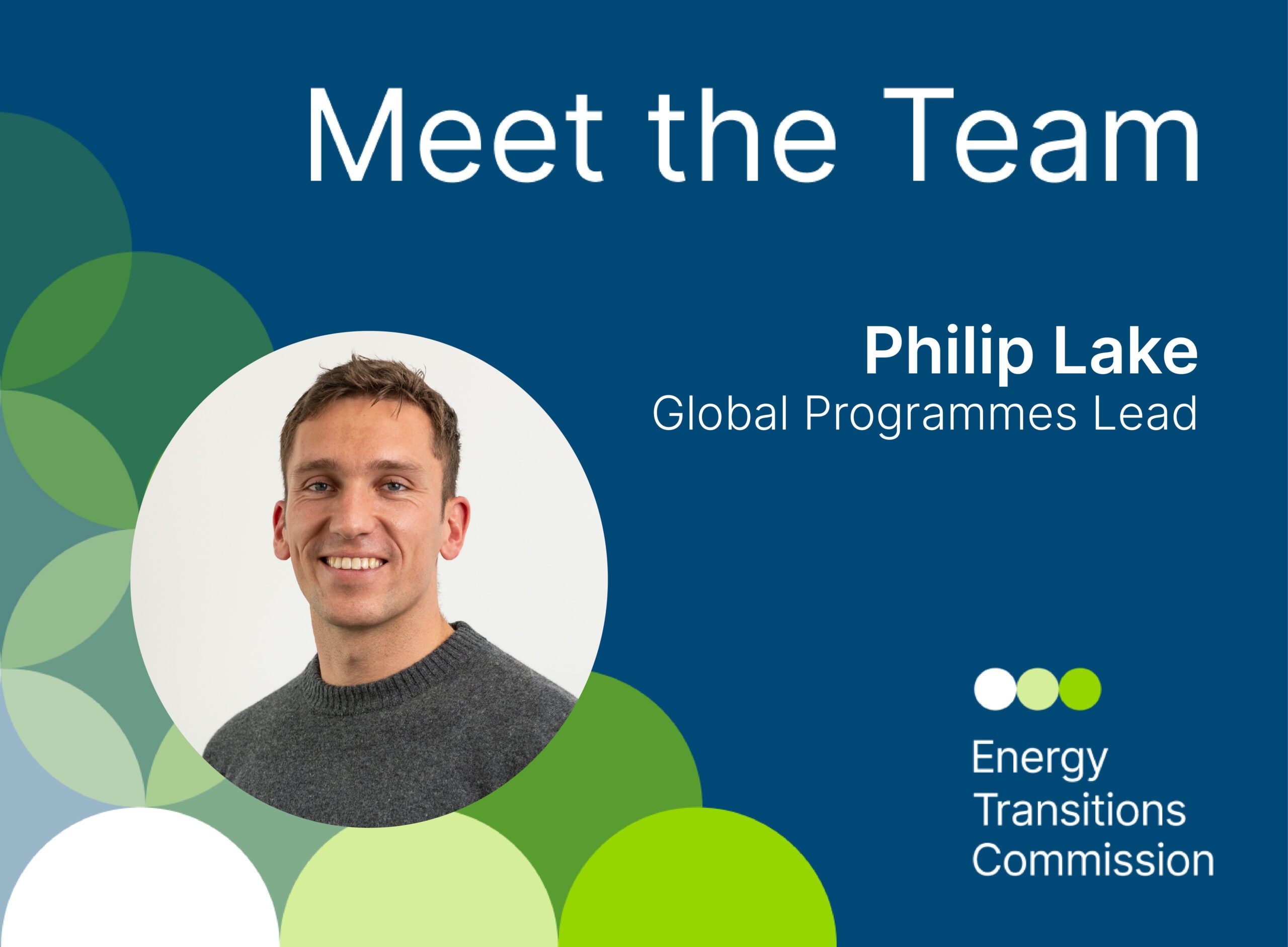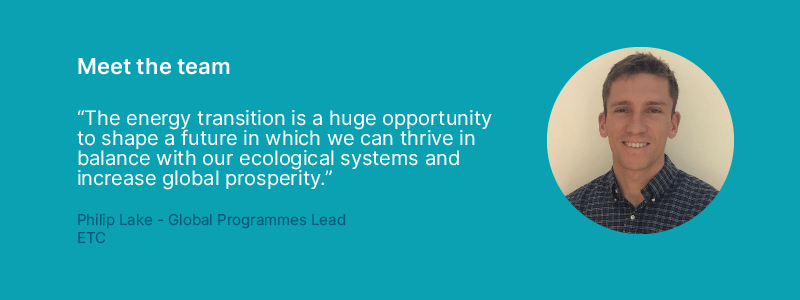-
What made you join the ETC?
I had wanted to join the ETC for quite a while. I got to know the ETC during my time at the World Economic Forum. I was immediately impressed by the depth of knowledge but importantly the clarity and positivity of messaging/insights. Having slowly transitioned from a mechanical engineer designing buildings, to working on net-zero cities I wanted to step towards an understanding of the big picture of our energy system transformation and draw on my technical background, and the ETC seemed like a perfect fit!
Working on the puzzle of global decarbonisation is inherently fascinating and something we get to see play out over what will be my working career. Being able to work alongside brilliant people to articulate the challenges, learn about what needs to be done, and how we can achieve it seemed like (and has been!) a rewarding way to spend my time!
-
What is your proudest achievement to date at the ETC?
There isn’t only one singular achievement, overall, I’m really proud to see the regional chapters expand over the last two years and to see the high-ambition corporate coalitions expand globally. We’ve seen growth of regional chapters in Japan, Canada, the US, and Australia (albeit formed before my time), alongside the addition of a sub-Saharan Africa programme this year. Across everyone working on regional programmes it is a really big achievement. I’m proud of all the work that goes on behind the scenes in aligning stakeholders and different expectations, working with different cultural norms and sharing lessons learned. Each regional chapter is bespoke and seeing the ETC impact and network grow globally is fantastic.
Within that, there are two powerful areas of work that I’m particularly proud of. First is what we’ve achieved over the last 18 months with the ETI-CGC Japan team because I think that this coalition can be really transformative in the Japanese economy. We built a coalition of very strong, very high-profile companies in Japan that are now challenging the engrained mindsets and collaborating towards a high-ambition net-zero strategy to meet Japan’s climate goals.
The second is our programme in sub-Saharan Africa where we’re addressing very complex, high-tension issues with clear and objective analysis. Doing it in this way has resulted in very positive feedback and buy-in from critical voices in the debate. Informing those critical voices ahead of and at COP27 has been excellent. It shows the power of the ETC working with local partners and our ability to present robust, pragmatic insights that can really help change the narrative in critical regions.
-
What does the energy transition mean to you?
I’ve always thought of the energy transition as a vital transformation but an inherently exciting opportunity. It’s an opportunity to do things better. To be more creative. To work towards a fairer and more equitable system and one that leads us into virtuous cycles. I don’t think the scale and urgency can ever be impressed enough but I believe it’s super important that we remain pragmatic and optimistic if we are going to make the changes we need. We must also recognise the responsibility that we have, and that extends beyond just ourselves and future generations but to be stewards of our shared biosphere and ecosystems. The energy transition is a huge opportunity to shape a future in which we can thrive in balance with our ecological systems and increase global prosperity.
The other overwhelming thought I have is that we live at such a crucial moment. Our working careers fall within the pivotal decade to drive change and correct our course. Those born now will not have the ability to influence and secure the outcomes we need. While that is a huge amount of responsibility, it’s also an incredibly exciting opportunity to really form the future of our civilization.
-
On the pathway to net zero, what do you think is the biggest obstacle?
To me, one of the biggest obstacles is our built environment and specifically building retrofits. I originally started my working career in oil, but quickly found myself in the buildings industry, designing mechanical systems and conducting sustainability assessments for airports, stations and commercial buildings, and embedded in a very fragmented industry. I became so aware of the many misaligned incentives and the far-reaching implication of seemingly small decisions. Creating sustainable cities and transitioning our existing building stock is such a mammoth task and one of the hardest areas because it’s so interconnected yet decentralised.
In building heating we require millions of building owners to act, and the core drivers of these decisions are cost and convenience. Even with all the information, tolerance for any inconvenience or added cost is so slim, that it puts such a barrier to actually getting change at scale and at pace. Achieving a truly net-zero carbon built environment, (and ideally regenerative) is one of the most fundamental and protracted challenges that we face.
We see across harder-to-abate sectors the pathways are by and large there, in part thanks to our brilliant MPP colleagues! In these more centralised sectors, it is mission possible! But it’s very hard to incentivise all individual customers and homeowners to make the required changes, especially when we have such economic constraints at the moment, like the energy crisis and the cost of living crisis. We must be better at recognising, capturing and communicating total value to affect better decision-making.
-
What are you most excited about that’s coming up at the ETC?
We’ve now formed a very strong team over the last two years, one that has a tremendous skill set and range of capabilities. I’m really excited to see this team develop now that it’s established and continue breaking new ground in critical issues such as removing barriers to clean electrification, the material and resource needs and the role of fossil fuels. Every individual brings a valuable range of expertise and strengthens the team in a different way. It’s apparent we’re delivering value in many directions, and seeing the impact grow is inspiring.
On the content side, I’m most excited about seeing our rich and connected picture of the energy transition develop further and be leveraged to speed up implementation. Across ETC and MPP, we have covered such breadth, not only on the role of critical technologies but we now have very detailed sector transition strategies and are forming a truly comprehensive perspective. I don’t think anybody else is really doing this, especially not in the clearly articulated, objective, and digestible way of the ETC. So it’s exciting to be able to take our messages further in 2023 and be engaging leaders to accelerate implementation.
-
What’s the best piece of advice that you’ve received from an ETC colleague?
Don’t forget to enjoy it! – We have all chosen to work in a field pushing for positive change for all, but the problems we face are complex, interdependent, and genuinely urgent. Sometimes it can often feel like we can never do enough! However, we are lucky to work among brilliant people, all actively making a difference in this fascinating and ever-evolving field. It’s always worth stepping back and sharing a smile.




